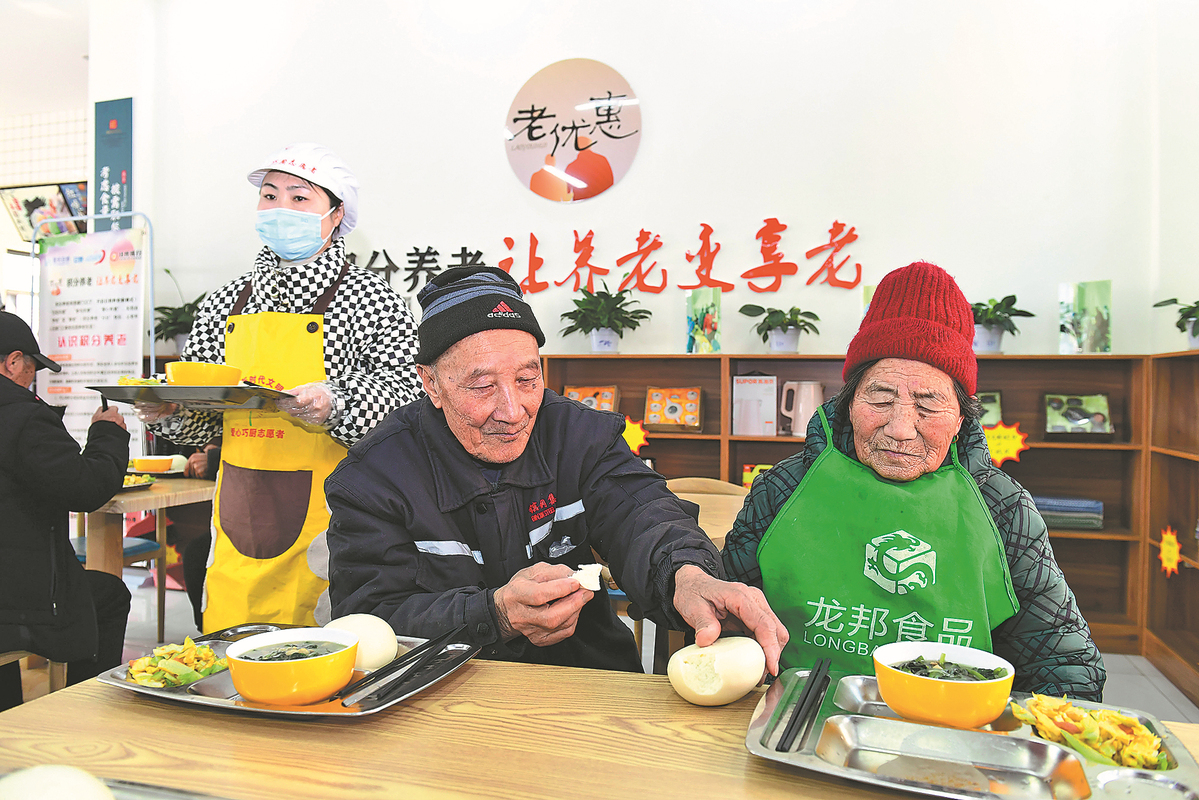Notification announcement
Senior population quick-growing target for caterers
Date:2023-03-07

At a residential community in Chengdu, Sichuan province, a local nutritious food company, Xinheliangchu, regularly provides elderly people with catering services to facilitate their post-retirement life.
The meals on offer are carefully arranged by nutritionists from the company, who are graduates of China Agricultural University, having majored in food science and nutritional engineering. The seniors are free to choose from a nutritious menu containing high-quality proteins, vegetables and minimally processed carbohydrates, said Liu Hongyang, general manager of Xinheliangchu.
For those with high blood pressure or diabetes, there are food recommendations including meals cooked with less oil and salt as well as staple foods with low glycemic indexes, he said.
"Lunches, which are 14 yuan ($2) on average, are popular among the elderly residents. We usually bring the meals to the public activity room at 11:45 am, and the seniors come over one after another at around noon. It takes them around 20 minutes to finish the meal, and they will chat with each other for over an hour. They enjoy the sense of belonging to a group.
"The elderly long for communication and companionship. Our canteen offers them a place to gather together and converse, thus enjoying a group-oriented living experience. One elderly woman always carries her delicate blue-and-white porcelain tableware to the canteen. She thinks the canteen is a place to present her best self to others," Liu said.
The catering industry serving the elderly — those over 60 years of age — in China has been growing rapidly in recent years. A report from global consulting firm PWC showed that in 2020, China's senior-focused catering sector surpassed 1.6 trillion yuan. Annual average per capita consumption among seniors was 22,600 yuan, among which catering consumption took up 7,972 yuan, or 39 percent.
With the huge business potential, numerous enterprises have begun to invest in the sector. As early as 2017, Changzhou, Jiangsu province-based Lihua Fast Food began to work with local communities to offer food delivery services for the elderly. It also held free regular sample promotion activities to attract more consumers. Within half a year, the company's daily order volume surged from several hundred to some 4,500.
Other renowned chain stores, such as ZKungfu, China Quanjude Group, Yonghe King, Hehegu, Jinbaiwan Restaurant, Yoshinoya and Jiaheyipin have all launched products and services for seniors.
However, many obstacles exist in the catering industry for the elderly. Jiang Jianping, chairman of Lihua Fast Food, said: "The elderly consumers have relatively high requirements toward food quality, safety, restaurant facilities and taste. High-quality requirements, complex demand, large investment and a slow profit circle have brought great challenges to the development of the catering industry for the elderly."
Enterprises and governments at all levels should work together to bring better products and services to the elderly people, industry experts said.
In 2022, Anhui province launched a dining-assisting activity for the elderly. It utilized existing resources and gave full play to the role of existing elderly care services. Specifically, it integrated and utilized the existing tertiary centers and various elderly care service institutions and facilities to carry out elderly meal services.
So far, among the built canteens for the elderly, 2,352 or 39.1 percent were based in elderly care facilities, 2,044 or 34 percent were based in elderly care service institutions, 409 or 6.8 percent were based in catering enterprises, and only 852 or 14.1 percent were newly built, demonstrating the canteens were taking full advantage of existing resources.
Anhui province plans to build 8,550 canteens for the elderly by the end of 2023, and establish a well-balanced and accessible elderly meal service network covering urban and rural areas by 2025. Currently, it has built 6,018 canteens for the elderly, serving over 4.5 million people.
"To better serve the elderly people, enterprises may consider pre-made dishes, which are convenient and nutritionally balanced for the elderly, and effectively lower enterprises' operation costs. They may also take advantage of advanced technology, such as unmanned, internet-of-things-enabled intelligent catering, to serve the elderly people. Data collected by the internet can record elderly consumers' basic information and eating habits, which can serve as a reference for future management," said a report from Guangzhou Blue Health Technology Co Ltd.
(Source: China Daily)

